Are you an animal lover seeking a fulfilling career path? The world is full of exciting Jobs Where You Work With Animals, far beyond the typical veterinarian role. For those passionate about creatures big and small, domestic or wild, numerous opportunities exist to build a career around your love for animals. While veterinary medicine is a popular choice, the spectrum of animal-related professions is incredibly diverse, ranging from marine biologists studying ocean life to wildlife rehabilitators caring for injured animals and even unique roles like snake venom milkers. Let’s dive into a comprehensive list of animal careers to ignite your inspiration.
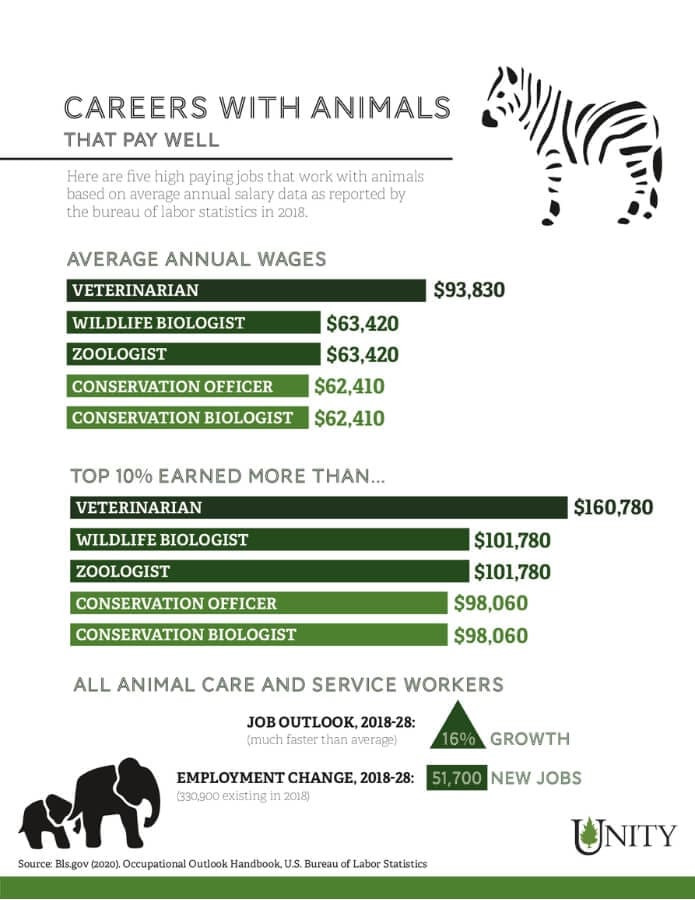 Infographic showcasing diverse salaries for various animal-related careers
Infographic showcasing diverse salaries for various animal-related careers
Careers Dedicated to Animal Rescue
For individuals driven by wildlife conservation and animal welfare, animal rescue offers a deeply rewarding career path. Jobs where you work with animals in rescue extend beyond just the direct care of injured and orphaned creatures. Animal rescue professionals are involved in all aspects of rehabilitation, from the initial rescue and treatment to the crucial planning for their eventual release back into their natural habitats. These roles also encompass vital outreach through education and volunteer program management.
While a formal college degree isn’t always a strict requirement for entry-level animal rescue jobs, it is highly recommended and often becomes essential for career advancement. A degree can unlock numerous opportunities and may be necessary for specialized roles in veterinary care and research within rescue organizations. Flexibility and adaptability are key traits, as animal rescue work requires professionals to be comfortable in diverse environments. Time is spent outdoors during rescues and releases, while animal centers and clinics are where therapy, surgeries, and medical procedures take place.
Recommended Degree Program: BS in Animal Health and Behavior
- Marine Rescue Officer: Responding to marine animal emergencies, conducting rescues, and enforcing marine wildlife protection laws.
- Wildlife Rehabilitator: Caring for injured, sick, and orphaned wild animals with the goal of releasing them back into their natural environment. This is a hands-on job where you work with animals needing specialized care.
- Animal Shelter Technician: Providing daily care for animals in shelters, including feeding, cleaning, and basic health monitoring. These are crucial jobs where you work with animals in a shelter setting.
- Animal Shelter Manager: Overseeing the operations of an animal shelter, managing staff and volunteers, and ensuring the welfare of animals in care.
- Animal Health Inspector: Enforcing regulations related to animal health and welfare, inspecting animal facilities, and investigating animal cruelty cases.
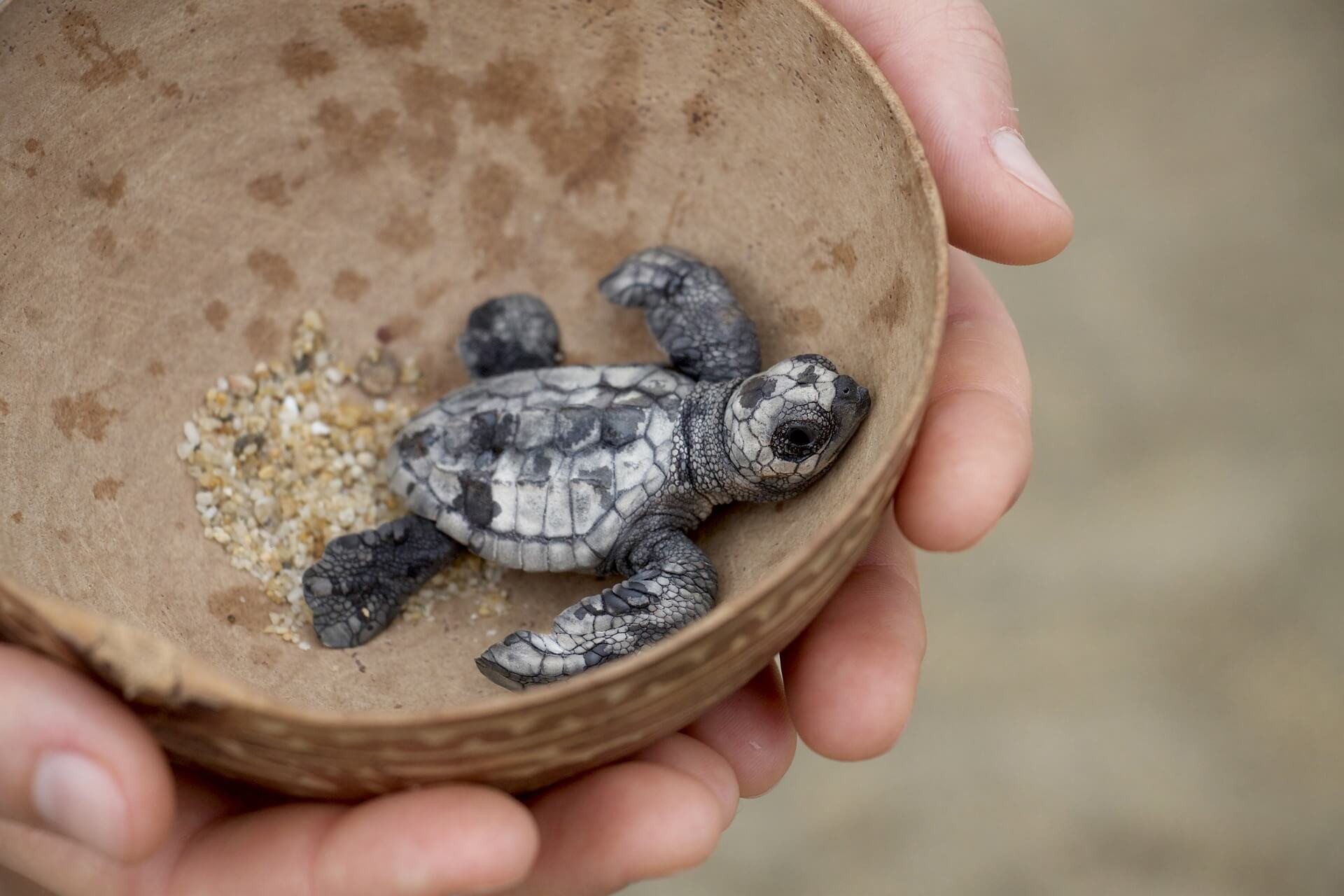 A person holding a small sea turtle in a bowl
A person holding a small sea turtle in a bowl
Veterinary Careers: Caring for Animal Health
Veterinary careers are perhaps the most well-known jobs where you work with animals. Within veterinary medicine, professionals can specialize in a wide range of areas. A wildlife veterinarian, for instance, might focus on the health of wild animals, including exotic species, while a small animal veterinarian typically works with domestic pets like cats, dogs, and birds. Becoming a veterinarian demands significant education, including a four-year bachelor’s degree, followed by a doctorate program in veterinary medicine, and successful completion of a state licensing exam.
For those seeking jobs where you work with animals with a shorter educational path, consider roles like veterinary technicians and veterinary assistants. These vital team members play crucial roles in animal care, assisting veterinarians with examinations, administering medications, updating patient records, and providing compassionate care. Essential skills for success in veterinary careers include strong communication, empathy, and critical thinking abilities.
Recommended Degree Program: BS in Animal Health & Behavior
- Veterinarian (Read more below): Diagnosing and treating animal illnesses and injuries, performing surgeries, and providing preventative care. This is a highly respected job where you work with animals and their owners.
- Veterinary Technician: Assisting veterinarians in medical procedures, administering medications, performing lab tests, and providing nursing care. This is a hands-on job where you work with animals in a clinical setting.
- Veterinary Assistant: Supporting veterinary technicians and veterinarians with animal care tasks, including cleaning, restraining animals, and assisting with basic procedures.
- Animal Nutritionist: Developing and implementing animal diet plans to optimize health and well-being. This is a specialized job where you work with animals‘ dietary needs.
- Veterinary Pharmaceutical Sales Representative: Selling and promoting veterinary pharmaceutical products to veterinarians and clinics. While not direct animal care, it’s a job where you work with animals indirectly by supporting their healthcare.
- Equine Dental Technician: Specializing in dental care for horses, ensuring their oral health and performance. This is a niche job where you work with animals, specifically horses.
Jobs Working With Wild Animals: Conservation and Preservation
Jobs working with wild animals require a unique blend of passion and resilience. These roles are for individuals deeply committed to animal welfare and wildlife preservation. While some professionals may specialize in specific animal groups, others work with diverse wildlife, from reptiles to large mammals. Due to the nature of the work, professionals in jobs working with wild animals must be detail-oriented, excellent communicators, and physically fit.
The work environment in jobs working with wild animals is varied. Some days may be spent in the field conducting research or monitoring populations, while others may be in conservation habitats, animal sanctuaries, or even offices and labs for data analysis and report writing. Wildlife careers aren’t solely for those directly interacting with animals; administrative roles in project planning and educational program management are also crucial for conservation efforts.
Recommended Degree Program: BS in Wildlife and Fisheries Biology
Jobs Working With Aquatic Animals: Exploring the Marine World
If you are drawn to the water, aquatic animal-related jobs offer a fascinating career path. Professionals in these jobs where you work with animals may find themselves working by the ocean, at aquariums, marine parks, or even in research facilities inland. Some aquatic jobs where you work with animals involve scuba diving in the ocean or aquarium tanks, but many roles are available that keep you on dry land while still contributing to aquatic animal welfare and research.
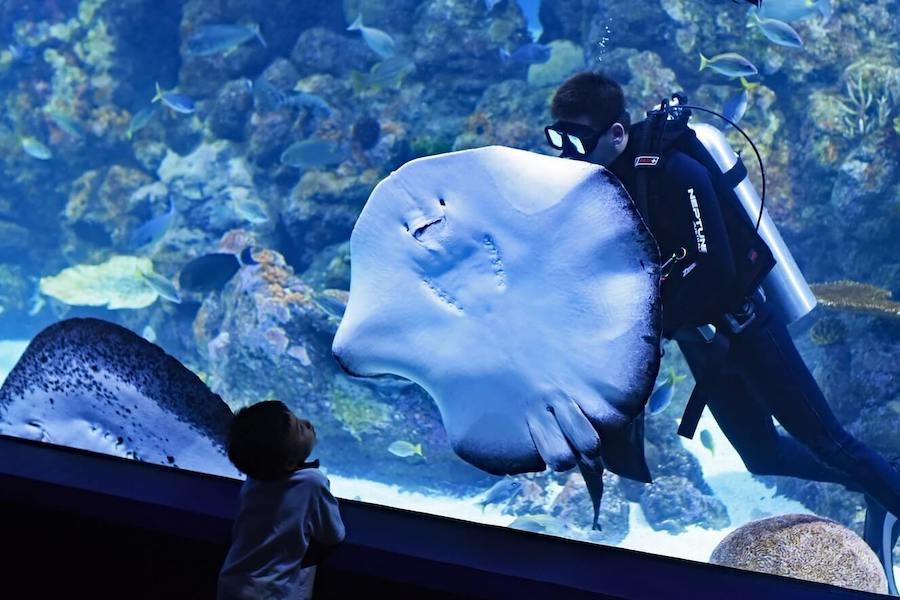 An aquarist surrounded by marine life in a large aquarium
An aquarist surrounded by marine life in a large aquarium
Success in jobs working with aquatic animals requires curiosity and keen observation skills. Whether you’re monitoring a whale, shark, or dolphin, understanding animal behavior and needs is paramount. Aquatic animal careers are diverse. Marine mammal trainers work closely with dolphins and whales in zoos and marine parks. Aquarists are responsible for the care of diverse fish and invertebrate collections in aquariums. Museum curators and researchers contribute to aquatic animal knowledge from a more academic setting. A bachelor’s degree is often a minimum requirement, along with certifications like scuba diving or CPR for certain roles.
Recommended Degree Program: BS in Marine Biology
- Aquarist: Caring for fish and other aquatic animals in aquariums, monitoring water quality, and maintaining exhibits. This is a hands-on job where you work with animals in an aquarium environment.
- Marine Biologist: Studying marine life, ecosystems, and conservation issues in oceans and other aquatic environments. This is a research-oriented job where you work with animals and their habitats.
- Marine Mammal Trainer: Training marine mammals like dolphins and seals for performances, education, and research in marine parks and zoos. This is an interactive job where you work with animals and train them.
Jobs Working With Dogs: Canine Companions and Careers
For dog enthusiasts, jobs working with dogs are plentiful and varied. These jobs where you work with animals require energy and patience, as dogs are active and sometimes require significant handling. Physical strength is also beneficial, especially for roles involving walking or handling larger dogs.
While a college degree isn’t always mandatory for entry-level jobs working with dogs, it can be a significant advantage. Degree programs in animal behavior or animal science provide valuable skills in animal training, behavior understanding, and basic animal healthcare, potentially leading to faster career advancement and specialized roles.
Opportunities in careers with dogs are broad. Dog walkers and pet sitters can find clients through online platforms and local networks. Groomers can work in pet stores or establish their own businesses. K9 police dog handlers typically require a criminal justice background and extensive field training after becoming police officers.
Recommended Degree Program: BS in Animal Health & Behavior
- Dog Walker: Providing exercise and companionship for dogs, walking them for owners who are busy or unable to. This is a flexible job where you work with animals outdoors.
- Groomer: Bathing, brushing, and styling dogs’ coats, providing nail trims and other grooming services. This is a hands-on job where you work with animals and their appearance.
- K9 Unit Officer/Trainer: Working with and training police dogs for law enforcement tasks like detection, patrol, and suspect apprehension. This is a specialized job where you work with animals in law enforcement.
Unusual Animal Jobs: Niche and Necessary Roles
If you seek a less conventional path, unusual animal jobs offer unique and impactful ways to work with animals. These lesser-known jobs where you work with animals can make a significant difference in animal welfare and conservation.
Animal relocation workers transport animals from overcrowded shelters to facilities with more space and resources, reducing euthanasia rates. Snake venom milkers play a critical role in extracting venom used to create antivenom, a life-saving treatment for snake bites in both humans and animals.
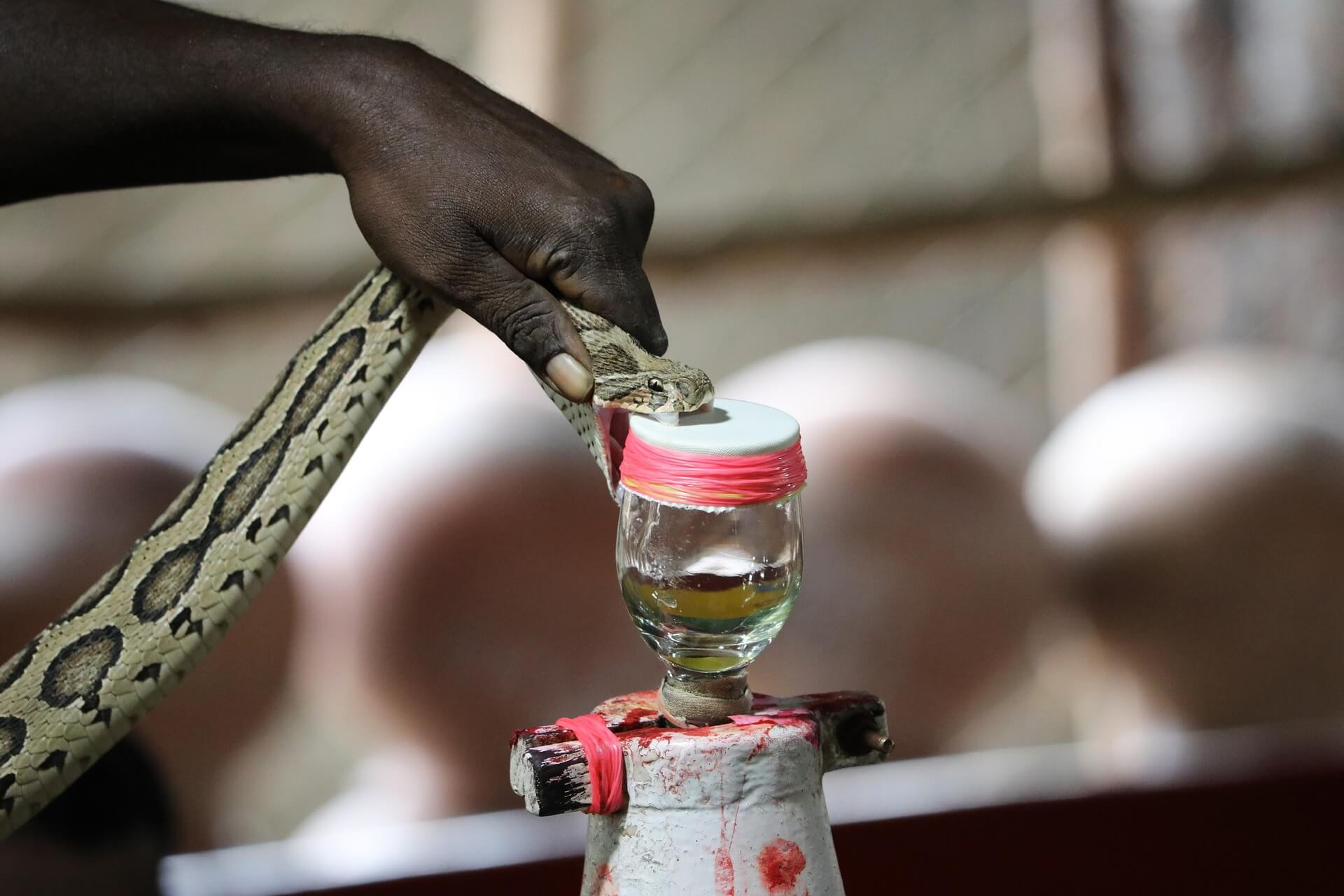 A snake venom milker carefully extracting venom from a snake
A snake venom milker carefully extracting venom from a snake
Working with animals, even with expert handlers, can be unpredictable. Meticulous attention to detail is essential in any job where you work with animals, whether domestic or wild. Professionals in even the most unusual animal jobs must have a strong commitment to animal welfare. While degree requirements vary depending on the specific role, a relevant degree program can significantly enhance skills and career prospects in these unique fields.
Recommended Degree Program: BS in Wildlife Conservation
- Snake Venom Milker: Extracting venom from snakes for antivenom production, a crucial role in medical and veterinary fields. This is a specialized and unusual job where you work with animals.
- Relocation Worker: Transporting animals between shelters and rescue organizations to improve animal welfare and adoption rates. This is a logistical job where you work with animals‘ welfare in mind.
- Animal Scientist: Conducting research on domestic animals, wildlife, or laboratory animals in fields like nutrition, genetics, or behavior. This is a research-based job where you work with animals indirectly through study and analysis.
High Paying Animal Jobs: Combining Passion and Prosperity
When considering career options, salary is often a significant factor. Many high paying animal jobs are concentrated in research, science, and conservation sectors. While financial reward might not be the primary motivator for everyone passionate about animals, a comfortable living is still important. The good news is that you can pursue your passion for jobs where you work with animals while also earning a competitive salary. Let’s explore some animal science careers with promising job outlooks and earning potential.
Wildlife Biologist
Wildlife biologists often spend considerable time outdoors, making it an ideal career for those who love nature and travel. In the field, they study animals in their natural habitats, observing their behaviors, interactions with other species, and responses to environmental changes. Much of their work involves conducting research and experiments to understand animal ecology and conservation needs.
While fieldwork is a major component, wildlife biologists also spend time in offices and labs analyzing data, studying specimens, and writing reports. Most wildlife biologist jobs require a bachelor’s degree as a minimum, and many employers prefer candidates with a graduate degree, even a Ph.D., for advanced research and leadership positions.
- Average Salary (2021): $64,650
- Currently Employed in the U.S (2020): 18,500
- Recommended Degree Program: BS Wildlife and Fisheries Biology
Veterinarian
A veterinarian remains one of the highest-paying animal careers. The field offers diverse specializations. Mixed practice veterinarians work with a variety of animals, from pets to livestock to exotic species. Others specialize in companion animals like dogs and cats.
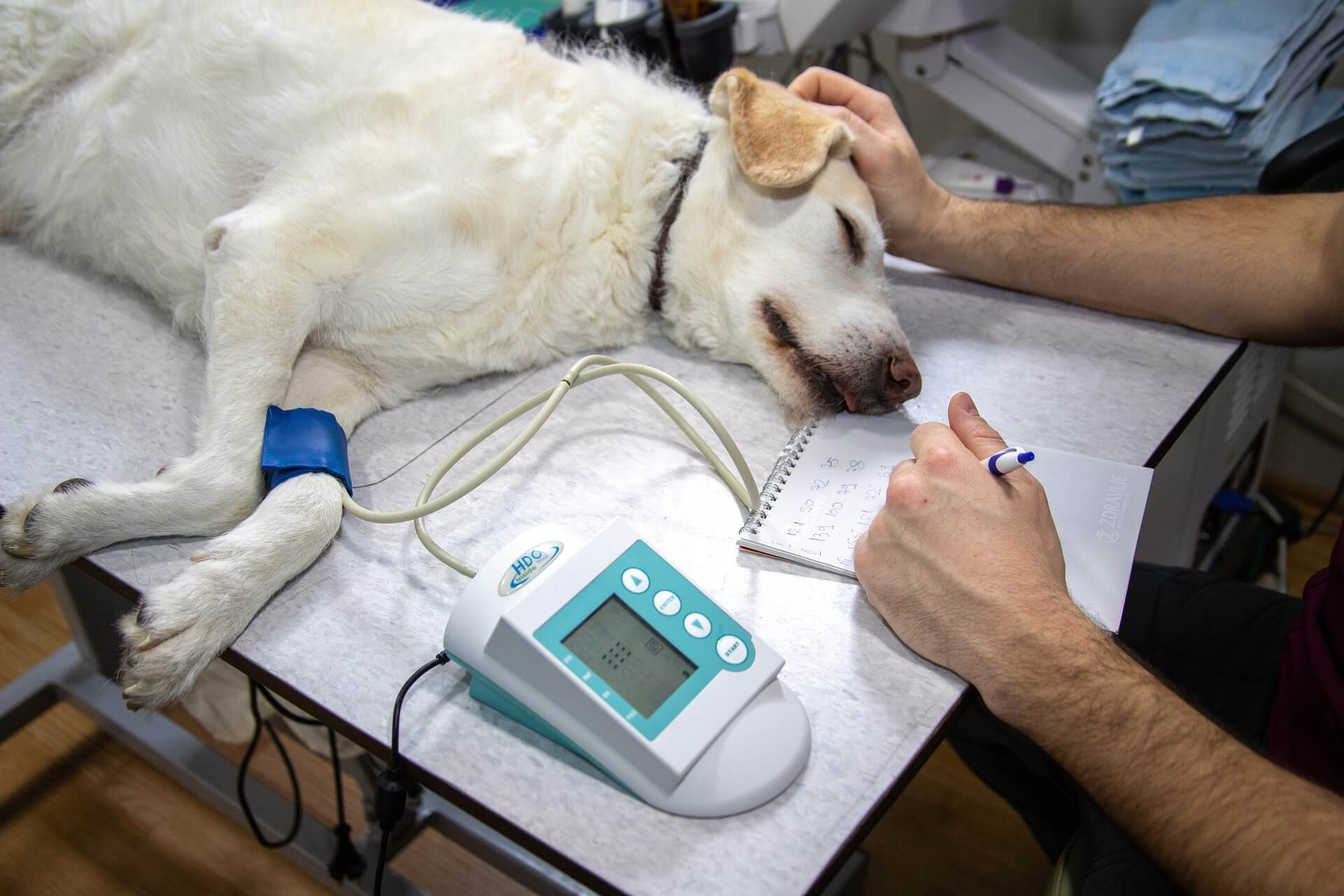 A veterinarian monitoring a dog recovering from surgery
A veterinarian monitoring a dog recovering from surgery
Some veterinarians pursue research careers, studying animal diseases and developing new treatments and preventative measures. Research-focused veterinary positions are often among the highest paid. Veterinary career paths include:
- Small Animal Veterinarian
- Veterinary Surgeon
- Veterinary Pathologist
- Zoo Veterinarian
Becoming a veterinarian is a significant commitment. It requires a bachelor’s degree, followed by a Doctor of Veterinary Medicine (DVM) degree, and passing a licensing exam. Despite the extensive education, a veterinary career is a highly rewarding and impactful way to dedicate your life to animal care.
- Average Salary (2021): $100,370
- Currently Employed in the U.S (2020): 86,800
- Recommended Degree Program: BS Animal Health & Behavior
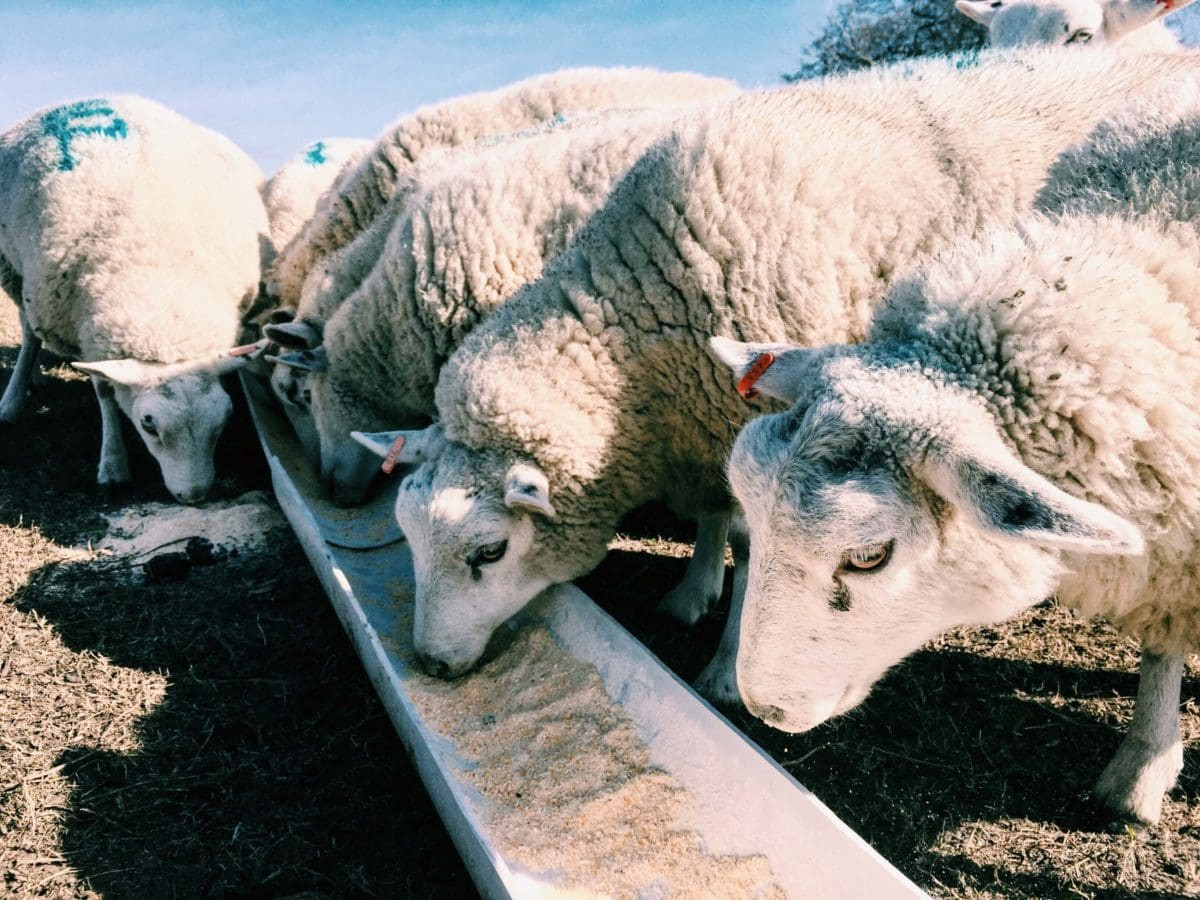 Sheep eating hay from a trough in a farm setting
Sheep eating hay from a trough in a farm setting
Animal Nutritionist
If you want to improve animal health and well-being through diet, consider becoming an animal nutritionist. Their primary role is to develop customized diet and lifestyle plans to ensure optimal animal health. Given the diverse nutritional needs of different animal species, creativity and a genuine passion for animal welfare are essential for success in this field.
A bachelor’s degree in animal science or a related field with a strong emphasis on nutrition is generally required. Gaining practical experience through volunteering at animal shelters or working part-time in veterinary clinics can be highly beneficial preparation. While some work is field-based, assessing animal living conditions and dietary practices, animal nutritionists also spend time in offices and labs analyzing samples and developing dietary recommendations.
- Average Salary (2020): $80,390
- Currently Employed in the U.S (2020): 37,400
- Projected Demand (2020-30): 9%
- Recommended Degree Program: BS Animal Health & Behavior
 A dog resting in the shade while on a leash
A dog resting in the shade while on a leash
Animal Care Specialist
An animal care specialist role is very hands-on, focusing on the daily care, training, and well-being of animals. These jobs where you work with animals can be found in diverse settings, from zoos and animal shelters to kennels and research facilities. While entry-level positions may only require a high school diploma, becoming a specialist and building a successful career often necessitates a bachelor’s degree in animal science or a related field.
- Average Salary (2020): $28,600
- Currently Employed in the U.S (2020): 332,700
- Projected Demand (2020-30): 33%
- Recommended Degree Program: BS in Animal Science
Wildlife Conservationist
Protecting wildlife and natural environments is the core mission of wildlife conservationists. These professionals work in the field to study and mitigate the impact of human activities on wildlife populations and ecosystems. Common tasks include collecting samples, testing soil and water for pollutants, developing conservation strategies, and educating the public about environmental stewardship.
If you aspire to be the next Steve Irwin or Jane Goodall, a career as a wildlife conservationist might be your calling. This career typically requires a bachelor’s degree in zoology, wildlife biology, or a related field. Wildlife conservationists can work for federal or local government agencies, parks, zoos, and conservation organizations.
- Average Salary (2021): $68,230
- Currently Employed in the U.S (2021): 22,550
- Projected Demand (2020-30): 5%
- Recommended Degree Program: BS in Wildlife Conservation
Zoologist
Zoology encompasses a wide range of careers with animals, each with diverse specializations and responsibilities. Some zoologists focus on the impact of global environmental changes on wildlife, while others study animal behavior, diet, migration patterns, and genetics. By studying animal life, zoologists play a critical role in wildlife conservation, particularly for endangered species.
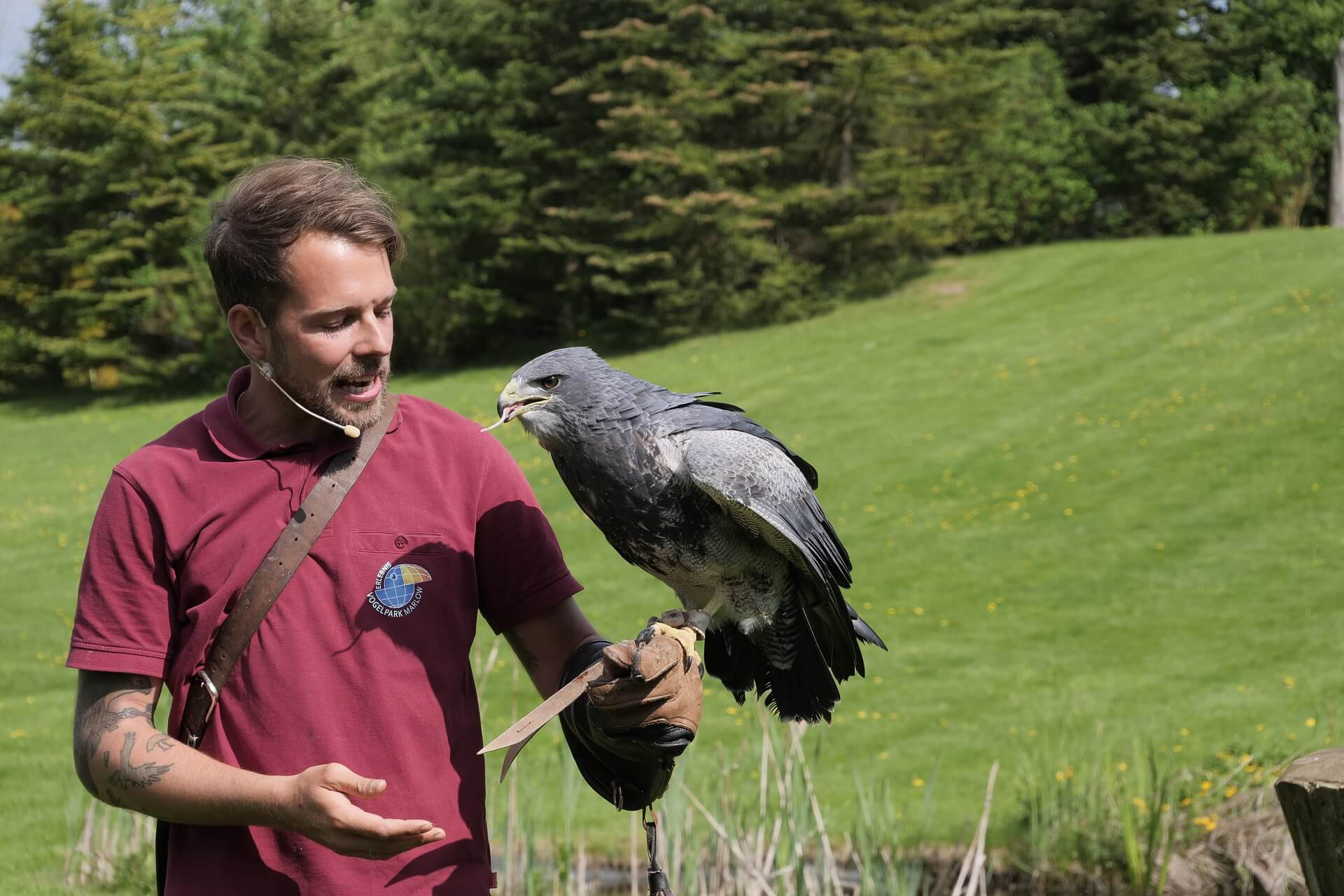 A zoologist holding a bird of prey
A zoologist holding a bird of prey
Most entry-level animal jobs in zoology require a bachelor’s degree. While many zoologists pursue degrees specifically in zoology, others choose broader biology programs. After graduation, zoologists may work directly with animals in zoos or in the field studying wildlife in their natural habitats. Other career paths include working in museums or educational facilities, engaging with students and the public.
- Median Salary (2021): $64,650
- Currently Employed in the U.S (2020): 18,500
- Projected Demand (2020-30): 5%
- Recommended Degree Program: BS in Wildlife and Fisheries Biology
Conservation Officer
A conservation officer is vital for protecting wildlife habitats and ensuring compliance with environmental regulations. Although a conservation officer may occasionally interact with animals to relocate them or assist with injuries, their primary focus is on enforcing laws and regulations in parks, forests, and other natural areas. A game warden, for example, is a type of conservation officer who enforces hunting and fishing laws.
Success as a conservation officer requires a passion for the outdoors and an interest in law enforcement. A four-year degree in a related field, combined with criminal justice training, is highly beneficial. Aspiring officers can gain valuable experience through internships and volunteer programs.
- Average Salary (2021): $63,750
- Currently Employed in the U.S (2020): 39,000
- Projected Demand (2020-30): 7% (as fast as average)
- Recommended Degree Program: BS in Conservation Law Enforcement
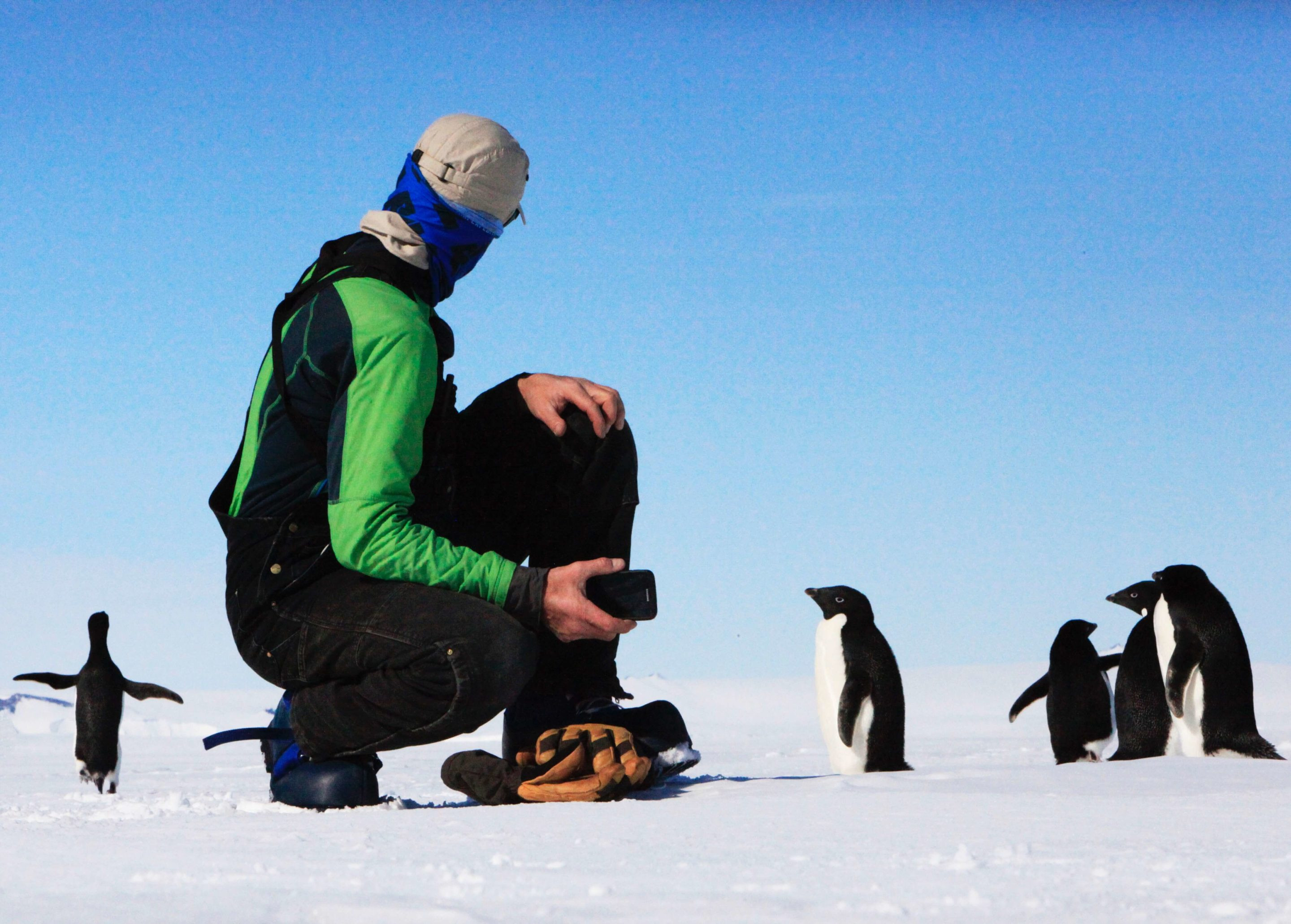 A conservationist observing penguins in a snowy landscape
A conservationist observing penguins in a snowy landscape
Conservation Biologist
Individuals with scientific curiosity and a passion for advocacy may thrive as conservation biologists. These biologists are advocates for endangered species, habitat preservation, and addressing the impacts of global environmental changes. Through scientific research and analysis, conservation biologists work to protect wildlife, their habitats, and the planet as a whole.
A bachelor’s degree is highly advantageous for a successful career as a conservation biologist, providing valuable research and analytical skills. Several years of relevant work experience are often required for advanced positions. Many aspiring conservation biologists gain experience through internships and volunteer opportunities. After completing their degree programs, conservation biologists typically find employment with government agencies and non-profit conservation organizations.
- Average Salary (2021): $63,750
- Currently Employed in the U.S (2020): 39,000
- Projected Demand (2020-30): 7% (as fast as average)
- Recommended Degree Program: BS in Wildlife and Fisheries Biology

